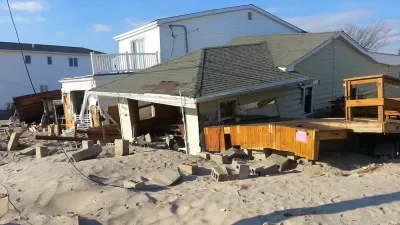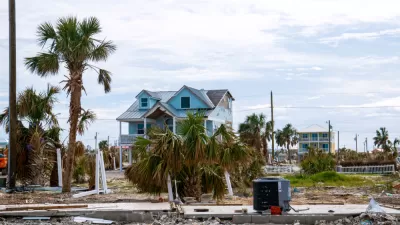The grant to fund a marsh restoration project in coastal Louisiana is the first of its kind under FEMA’s Flood Mitigation Assistance program, which is typically used to elevate, acquire, or relocate homes or floodproof businesses.

For the first time, the Federal Emergency Management Agency has used its Flood Mitigation Assistance grant funds for a major nature-based marsh restoration project targeted at reducing hurricane storm surge flood damage, according to an article from the Insurance Newsnet. Typically the program is used to underwrite the cost of “nonstructural” projects like elevating, acquiring, or relocating homes or floodproofing businesses. The FEMA grant will fund $14.8 million of a $21 million wetland restoration project in an area of St. Bernard Parish, Louisiana, where homeowners have had to file repeated severe flood insurance claims totalling $1.23 billion, reports Mark Schleifstein. State and local funding will make up the rest, and the project is expected to reduce future flood damage by millions of dollars.
“The project targets an area of open water and broken marsh outside the levee system between the northern rim of Lake Lery and the villages of Poydras and St. Bernard inside the southernmost part of the east bank hurricane levee,” according to the article. It will involve dredging the lake to create 400 new acres of wetland and building a 2.4-mile armored embankment. “By closing the broken part of the lake shoreline and recreating wetlands in the new open water area, officials hope to reduce the effects of surge and waves on the levee system.” The article also discusses additional investigations by the U.S. Army Corps of Engineers to look into further hurricane risk reduction in Louisiana.
FULL STORY: First-of-its-kind grant could reduce flooding, rebuild wetlands in this vulnerable part of Louisiana

Alabama: Trump Terminates Settlements for Black Communities Harmed By Raw Sewage
Trump deemed the landmark civil rights agreement “illegal DEI and environmental justice policy.”

Planetizen Federal Action Tracker
A weekly monitor of how Trump’s orders and actions are impacting planners and planning in America.

Why Should We Subsidize Public Transportation?
Many public transit agencies face financial stress due to rising costs, declining fare revenue, and declining subsidies. Transit advocates must provide a strong business case for increasing public transit funding.

Understanding Road Diets
An explainer from Momentum highlights the advantages of reducing vehicle lanes in favor of more bike, transit, and pedestrian infrastructure.

New California Law Regulates Warehouse Pollution
A new law tightens building and emissions regulations for large distribution warehouses to mitigate air pollution and traffic in surrounding communities.

Phoenix Announces Opening Date for Light Rail Extension
The South Central extension will connect South Phoenix to downtown and other major hubs starting on June 7.
Urban Design for Planners 1: Software Tools
This six-course series explores essential urban design concepts using open source software and equips planners with the tools they need to participate fully in the urban design process.
Planning for Universal Design
Learn the tools for implementing Universal Design in planning regulations.
Caltrans
Smith Gee Studio
Institute for Housing and Urban Development Studies (IHS)
City of Grandview
Harvard GSD Executive Education
Toledo-Lucas County Plan Commissions
Salt Lake City
NYU Wagner Graduate School of Public Service





























